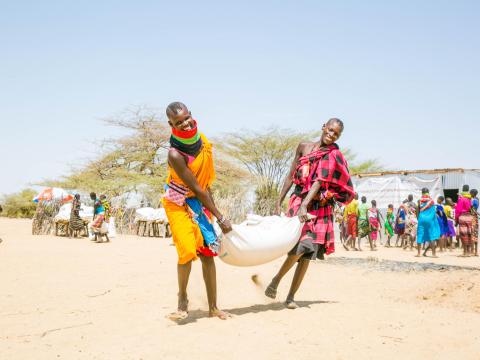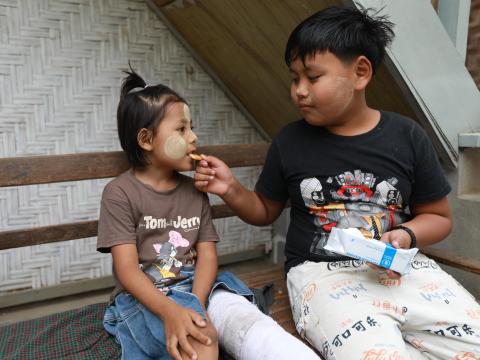
Finding hope in the midst of turmoil: lessons learned from the survivors of crises
There are many reasons to feel discouraged. The Ukraine crisis drags on seemingly without end. The first-hand impacts of climate change are becoming obvious to all of us. Around the world tens of millions of people are in the grip of a hunger and starvation crisis. And when I look at my country, the United Kingdom, one is confronted with a collapsing health service, strikes and ever-increasing prices.
I sense this mood of despair is gripping not just citizens of my own nation, but those in countries around the world. Many of us are feeling insecure. And, with that feeling comes a tendency is to batten down the hatches, protect what one has, look inward and prepare for the worst.
The urge to lockdown emotionally and with one another is understandable but should be resisted. The response from survivors of humanitarian crises, suggests that doing the opposite is key to getting through tough times. When disasters strike the poorest and most vulnerable communities know that if they are to rebuild, recover and restore what they once had they must work hard, collaborate and share with others, and grab opportunities to escape poverty. Openness to receiving and giving help, and to taking risks are not matters of choice but essential to survive conflict, destruction, starvation or economic chaos.
Ukraine’s response to the devastating impacts of war is an inspirational example of this. The fortitude of the country’s citizens in the face of bombardment, the loss of power, heating and water, and despite the forced displacement of millions, often to other countries, shows what’s possible.
The so-called 'illegal' migration journeys of refugees from places like Afghanistan, Eritrea and Somalia across borders and dangerous seas are also evidence of this determination, even if they are so controversial politically. And it’s not just about survival. Those living through or fleeing disasters are sustained by the hope of building a better life for themselves and their families and will seize any opportunity towards that end.
It’s worth reflecting on these things because one of the uncomfortable - and often unspoken – truths of humanitarian work is the imbalance at play when donors from developed countries support those who are less fortunate. In that donor-recipient relationship it can be easy to view the person being assisted as being entirely dependent on on donor goodwill and generosity and to underplay the drive and determination that the survivors of humanitarian crises have to better their own lives.
This is why, at the start of a New Year filled with so much uncertainty, it might be helpful to reflect on what lessons might be learned from those who have experienced living through natural or man-made disasters. These people might even be successful former refugees now living in your own countries.
Firstly, hold on to hope. If there isn't much around at the moment, work on building it. Fight against the tendency to look inward. Look outward. Find a community of friends and family who care... and who are ready to share. The COVID lockdowns we lived through have already shown us the surprising strength of our communities to rally in support of each other. By fanning the embers of hope, one will start to feel mentally and emotionally more positive and relationally more connected. The phrase, ‘A burden shared is a burden halved’, comes to mind. And with that positivity a vision for how to build back better - or differently - will begin to emerge.
Secondly, and this is more controversial, take some time to reflect on what having less, and feeling more vulnerable and insecure, might mean for the way you live life. Those of us living in the developed world have become so used to instant satisfaction - turning on a tap and clean water coming out, shopping online and having the product delivered the next day, flying overseas for holidays - that we might have lost sight of other important things that need nurturing. Those things might include appreciating nature and what it gives us, understanding the environmental impact of our consumer choices and potentially scaling them back, or nourishing the friendships, and community and neighbourhood relationships that are so essential to our mental health. Our reflections might also change how we think about those who are most vulnerable in our world.
In Charles Dickens “A Tale of Two Cities” the author opens with the line, “It was the best of times, it was the worst of times, it was the age of wisdom, it was the age of foolishness, it was the epoch of belief, it was the epoch of incredulity, it was the season of light, it was the season of darkness, it was the spring of hope, it was the winter of despair.”
Dickens’ seminal book was set during the French revolution. With all of us rocked by shifting economic, geopolitical, environmental and technological fault lines, it certainly feels like we are living through uncertain, confusing and even frightening times. I pray, that in the midst of them you will find and build your spring of hope.
James East, is Emergency Communications Director for World Vision international
